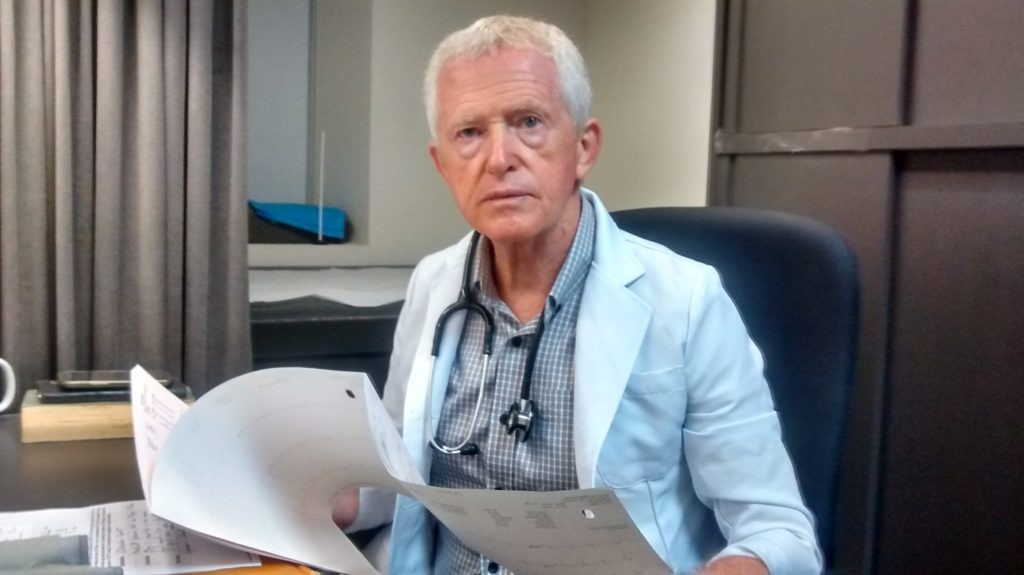– Robaird O’Cearbhaill
Hong Kong Correspondent
Healing the sick has been since the time of Jesus a Catholic act of charity and duty. Who better to reveal how that works is a medical doctor, so lets see behind the skin of a very experienced one – Paul Murray. Educated by the Jesuits in Glasgow he has widely travelled, working in Scotland, all over the Pacific, in Australia, Hong Kong and in several medical fields. But he has not just been doctoring. A keen sportsman in rugby and football, he took up acting professionally, ending up in a lead roles in the classic plays on stage. First let us put in context the proud history of the Church in health care, its valuable role in society.
Since the beginning of Christendom Catholics have healed the sick and now the Church is the biggest health care provider in the world. As Pope Francis said recently, “Health is not a consumer product but rather a universal right and therefore access to health care services cannot be a privilege.” But health care was not the norm before Christianity. As the historian of medicine Henty Sigarist and pioneer in socialist medicine pointed out “the Christian faith introduced the most revolutionary & decisive change in the attitude of society toward the sick. Christianity came into the world as the religion of healing, as the joyful Gospel of the redeemer and of redemption. It addressed itself to the disinherited, to the sick and the afflicted, and promised them healing, a restoration both spiritual & physical…. It became the duty of the Christian to attend to the sick and poor of the community.” And Pope Francis points out: “Health care ministry will always be a necessary and fundamental task, to be carried out with renewed enthusiasm by all, from parish communities to the largest healthcare institutions. Jesus bestowed upon the Church his healing power… The Church’s mission is a response to Jesus’ gift, for she knows that she must bring to the sick the Lord’s own gaze, full of tenderness and compassion.”
What is the best way to describe the profession of medicine?
“Good modern medical care—the melding of astute science and caring art.”
I know you said the Jesuits were very strict but what were the positive results of your religious education?
Christian/Catholic upbringing, education all in all good. Honesty, integrity along with discipline, benefits of hard work were good basic influences, strengths to have aboard commencing life’s journey.We had much fun too and still have close contact with several people from 50s/60s.
Friends from football then and now right?
We started a football team in ’67 in Glasgow and joined Saturday morning league. Team name “Steamboats.” Survivors had 50th Anniversary two years ago in Troon – a memorable weekend,even had a game football on the beach! Due to be repeated next May.
Surgery and dealing with terrible wounds is distressing how do you get over that? And what were the most distressing cases you had to treat?
Bloody, unsavoury sights? Not for me, had an idea what was in store. Worst events? Watching people, surrounded by family, die in front of you far from major center in Australia and helpless to change the outcome. Cardiac arrest and death of four year old boy in Glasgow Hospital when family had been reassured by my senior an hour or two before. That still stands out. Giving people bad news is never easy.
What were the most cheering times and most satisfying cases?
Happy events? Shared comradeship. Making difficult, accurate diagnosis and helping to find timely cure. The joy delivering newborn baby when all’s (eventually) gone well.
Good times, bad times, but some pleasure and satisfaction?
It’s intermittent. I can deal with things. Some come very well, that’s pleasure and satisfaction. A lot of mundane stuff. You have to be careful about over prescribing antibiotics when not needed as some doctors here do.
How different was Australia for you socially culturally from Scotland? More easy-going, perhaps less formality? In Sydney a lot more nationalities intermix than in Glasgow I suppose?
Didn’t find it hard to adjust in Australia apart from, to some extent, the relative loneliness, so far from old friends. Quite easy to integrate socially if you make the effort. The human quality that shines: honesty, integrity, kindness, consideration … are prized there too.
Tell me about your time in the Pacific – why and how did that happen?
It was soon after I had qualified. I always wanted to travel and got a job on a cruise ship and another. We went to Indonesia Vanuatu (more into the Pacific) Fiji and Samoa and New Zealand. I have good story about those places. In Fiji [I thought like South Pacific friendly] the taxi driver insulted me… He was waiting for some rich American tourist wanting a long ride, not a small fare. Next stop was Auckland. I did well in the football game got lucky and scored one missed one, the second one and got a smack right between the eyes. Not painful but bleeding a lot. Back at the ship I hoped the the senior doctor would to be there to stitch me up. Tried looking out for him. He wasn’t there- he was on the island. I had to stitch myself up up. Wasn’t as bad as the Russian doctor on an island in the Pacific. A surgeon he had to get his own appendix out, with local anaesthetic.
You were an actor for a while in Australia. Weren’t you in classic theatre top roles?
I liked acting and was in lead roles, for example Look Back in Anger by John Osborne, and Shakespeare’s Midsummer Night’s Dream. I had to stop because I had a child to take care of.


 Follow
Follow


